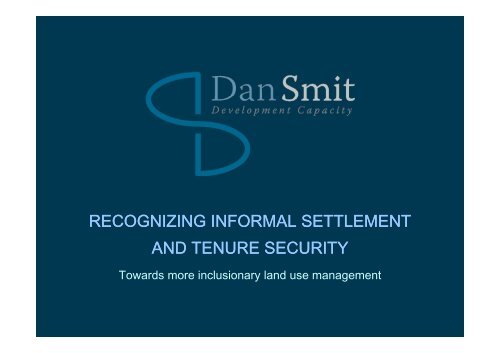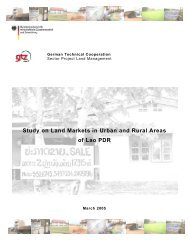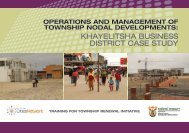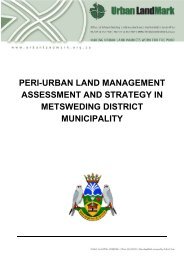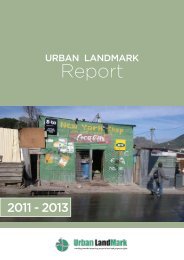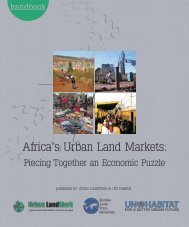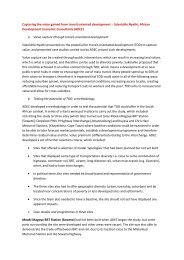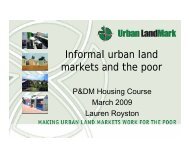Dan Smit - Urban LandMark
Dan Smit - Urban LandMark
Dan Smit - Urban LandMark
- No tags were found...
Create successful ePaper yourself
Turn your PDF publications into a flip-book with our unique Google optimized e-Paper software.
RECOGNIZING INFORMAL SETTLEMENTAND TENURE SECURITYTowards more inclusionary land use management
INTRODUCTION• Methodology : 3 phases• The Team
METHODOLOGY PHASE 1DEVELOPING AN APPROACH• Initial fleshing out of incremental tenure/special zone idea• Research Cameo’s/Interaction with key informants (lit.review; churn; policy and legislative; l local l land offices;regional contacts)• Testing incremental tenure/special Zones approach andemerging thinking with a Municipality• Continuing to engage with CoJ• Internal Consultant’s Workshop• Phase 1 Report and Process Plan
Phase 2• Follow-up Land Office Research and Design(Design and testing) (with government, civilsociety and private sector)• 2 nd Special Zone Testing with Municipality• Continue CoJ Interaction• 2nd Public Workshop• Finalise Approach and Write Up
Phase 3• Implementation Proposal for local land office pilot• Develop Learning and Presentation Materials
THE TEAM• Dr. <strong>Dan</strong> <strong>Smit</strong> : <strong>Dan</strong> <strong>Smit</strong> Development Capacity• Gemey Abrahams: Gemey Abrahams Consulting• Thulani Mthembu, Basil Sikhekhane and ErnestShelembi: Development Interface• Annette von Riesen : Atelier von Riesen• Peter Rutsch : Peter Rutsch Incorporated• Clive Forster : Development ManagementServices• Mark Misselhorn : Project Preparation Trust KZN
PHASE 1: MORE DETAIL
Research Cameos : Fleshing outincremental tenure/special zoneidea• Fishing expedition for ideas• However an attempt will be made up-front to fleshout the Special Zone idea (more central place forincremental tenure). The initial basket of fish.• Alternatives will also be developed. (Otherbaskets)
RESEARCH CAMEOS :RECOGNITION AND TENURESECURITY• Very ypractical orientation• Focus on space provided by existing legal andinstitutional frameworks.• Scan international research/best practice (GeoffPayne 2008)• UN Habitat: the standardized Core CadastralModel (CCDM)• ZEIS in Brazil
RESEARCH CAMEOS :RECOGNITION AND TENURESECURITY• Consideration of any alternatives identified viaregional scoping exercise• Review of existing ULM research• Identify limited number of localinitiatives/examples via networking)• Potential for application under existing laws• Potential for inclusion in a new LUMA• Design a range of alternative special zone“models”
RESEARCH CAMEOS:CHURN• Relation of tenure/recognition to“churn”/turnover/tradability.• Interview key informants• Scan of literature
RESEARCH CAMEOS:LOCAL LAND OFFICES• Identify and evaluate pertinent experiences• Systematic policy driven initiatives : IDT, or DLAPilot Land Reform Offices• Area Based Initiatives : CMDA• NGO/ CBO Initiatives (Phillipi Housing SupportCentre)• Telephonic interviews with key informants• Legal context of operation (in relation tomunicipality, deeds registry etc.)
RESEARCH CAMEOS: KEYDEVELOPMENTS IN THE POLICYAND LEGISLATIVE ENVIRONMENT• LUMB• NEMA• Provincial Ordinances• National Upgrading Support Programme• Ch 13 of the National Housing Code• Expanded People’s Housing Process• Second Economy Strategy Project (War on Poverty)
RESEARCH CAMEOS:REGIONAL EXPERIENCE• Scoping exercise• Angola, Namibia, Mozambique, Lesotho,Botswana, Swaziland.• Network approach• Key informants• 10 telephonic interviews• Literature scan/follow up
TESTING SPECIAL ZONESIDEA WITH MUNICIPALITY• Inception Workshop: Identification/counterpartidentified.• CoJ participation/Province• Documentation• First Testing Session• 4 weeks : Counterpart leads conceptdevelopment and implementation testing• Second Testing Session
Continued Interaction with CoJ• ULM Support – up to July 2008• Steering Committee (internal departments andGauteng Province)• Learning through development and application• Continued ULM /CoJ interaction• Documentation
INTERNAL BRAINSTORMINGWORKSHOP• The provision i of basic infrastructure t once settlements t have beenrecognized : what are legal and procedural impediments to servicing ;• Specifying how recognition via the mechanism triggers municipal andother interventions ti which h promote “inclusion”i • The relationship between ‘non-formally registered’ form of tenure andformally registered tenure and how can this non-registered form canlead to registered tenure;• The firming up of the scheme clauses: terminology, intent and scope• Ongoing management of the scheme clauses;• How to do this in a pro-poor way but still manage externalities and toachieve normal goals of land use management;• Moving from rezoning to upgrading;
INTERNAL BRAINSTORMINGWORKSHOP• Regulating building standards d and compliance;• Legal status of rezoned settlements: a broad-brushidentification of issues (rather than a detailed legalanalysis);• Implications for underlying land status;• How to deal with land use change;• Initial land status implications;• Complying with environmental and other sector legalrequirements;• Securing non-residential uses and promoting investmentton them under this system.
PROCESS PLAN ANDAPPROACH REPORT• To be developed at Workshop• Phase 1 culminates with report on Approach
PHASE 2: MORE DETAIL
Follow-Up Land Office• Follow-up research• Internal team workshop• Feasibility testing with :a. 1 st and 2 nd municipalityb. CoJc. NGO/CBOd. Private Sector (Cosmo City)
Testing Special Zones: SecondMunicipality• Identify• CoJ /2 nd municipality/Province participationp• Documentation• First Testing Session• 4 weeks : Counterpart leads conceptdevelopment and implementation testing• Second Testing Session
PHASE 3 : MORE DETAIL
Implementation Proposal forLocal Land Office• Internal Workshop of most implementationexperienced members of the team
Training and LearningMaterials• Workshop with Client• Training Course : Special Zones• Training Course : Local Land offices• ULM Website


